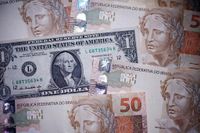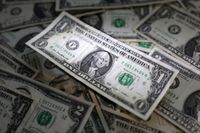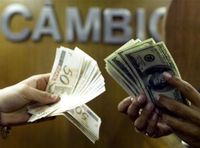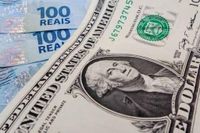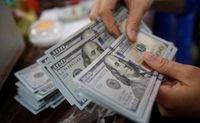The dollar registered another day of appreciation against the Brazilian real on Monday, April 7, 2025, climbing nearly 1% to reach R$ 5.90 around 14:30, Brasília time. This surge comes amid escalating fears of a global recession sparked by U.S. President Donald Trump's recently announced "tarifaço," or tariff hike, which took effect on April 5. The dollar had already reached a high of R$ 5.9313 earlier in the day.
Market reactions intensified following Trump's announcement on April 2, detailing reciprocal tariffs of 10% to 50% on imports from over 180 countries. This plan has raised concerns of a looming trade war, particularly after China retaliated by imposing a 34% tax on U.S. imports. The Chinese government warned that if the U.S. does not retract its tariffs by April 8, it will face an additional 50% tariff on its products starting April 9.
As the markets opened on Monday, the Brazilian stock index, Ibovespa, was down 0.80% at 126,243 points, having fallen nearly 2% earlier in the day. On Friday, April 4, the dollar closed at R$ 5.8382, marking a 3.72% increase. The pressure on the real has been palpable, with analysts noting that the recent tariffs could ignite a broader economic slowdown.
"The situation is precarious, and the potential for a trade war could significantly elevate inflation globally, impacting consumption and economic growth," explained Eduardo Moutinho, a market analyst at Ebury Bank. The apprehension surrounding Trump's tariffs has led investors to seek safer assets, such as government bonds and gold, further exacerbating the decline of emerging market currencies like the real.
In a stark warning, Goldman Sachs raised the likelihood of a U.S. recession to 45% in 2025 due to the escalating tariff conflict. The firm indicated that sectors tied to exports, technology, and agriculture would be the most vulnerable. This sentiment was echoed by Sidney Lima, an analyst at Ouro Preto Investimentos, who remarked that the economic landscape could become increasingly stagnant, with inflationary pressures compounding the challenges.
On the global stage, markets reacted sharply to the news of the tariffs. The S&P 500 index in the U.S. has already dropped over 20% from its recent peak, entering a bear market. The index experienced a staggering 10.5% decline in just two trading sessions, wiping out approximately $5 trillion in market value. Trump's tariffs have been particularly punishing for the so-called "magnificent seven" tech companies, which collectively lost $1.8 trillion in value over two days.
As the situation unfolds, the global markets are bracing for further volatility. The European STOXX 600 index fell by 4.2%, while the Hang Seng index in Hong Kong plummeted by 13.22%, marking its largest daily drop since 1997. The CSI300 index in mainland China also saw a significant decline of 7.05%.
In light of these developments, the Chinese government has announced controls over the export of rare earth materials, essential for many technological products, to the U.S. These materials include samarium, gadolinium, and dysprosium, among others. The Chinese Ministry of Commerce stated that the aim of these controls is to better protect national security and comply with international obligations.
"The imposition of tariffs has set off a chain reaction that could lead to a global economic slowdown," said financial analyst Vitor Miziara. He noted that as tariffs increase, the costs of goods will rise, leading to inflation and diminished consumer spending. This scenario poses a risk not only to the U.S. economy but to economies worldwide.
In Brazil, the Central Bank released its latest Focus Bulletin, maintaining projections for inflation and economic activity for 2025. The report highlighted a slight adjustment in exchange rate expectations, suggesting a lower rate of R$ 5.90 compared to previous estimates. However, the prevailing sentiment among analysts is one of caution, as the economic repercussions of the tariff war unfold.
As the dollar continues to rise, some analysts warn that it could soon surpass the R$ 6 mark, a level last seen in late November 2024. "If the current tensions persist, we could see further depreciation of the real, especially if capital flight accelerates," noted Elson Gusmão, director of operations at Ourominas.
The uncertainty surrounding Trump's tariff strategies has left investors on edge, with many seeking refuge in safer investments. The volatility in the currency markets is expected to continue as the geopolitical landscape evolves. The Brazilian economy, heavily reliant on trade with the U.S. and China, stands at a critical juncture as it navigates these turbulent waters.
In summary, the escalating trade tensions between the U.S. and China have injected significant volatility into global markets, with the dollar appreciating against the real as fears of a recession loom. As the situation develops, both local and international markets will remain vigilant, anticipating further economic fallout from these unfolding events.
